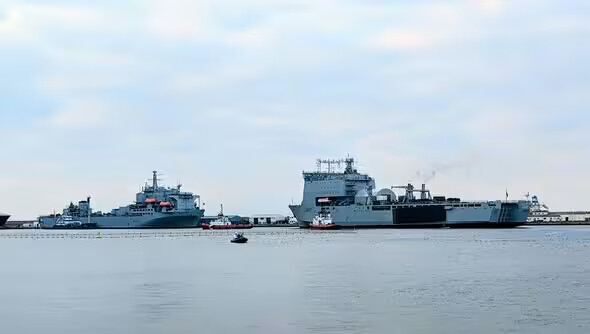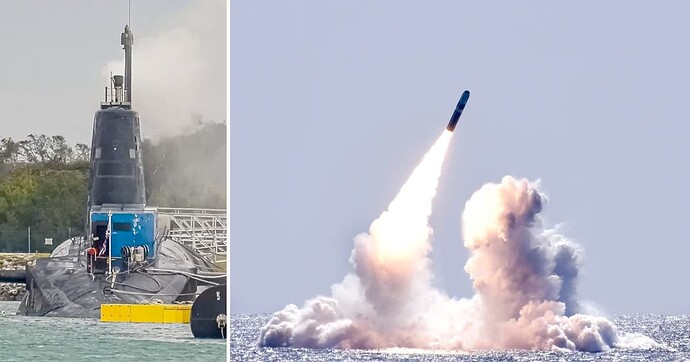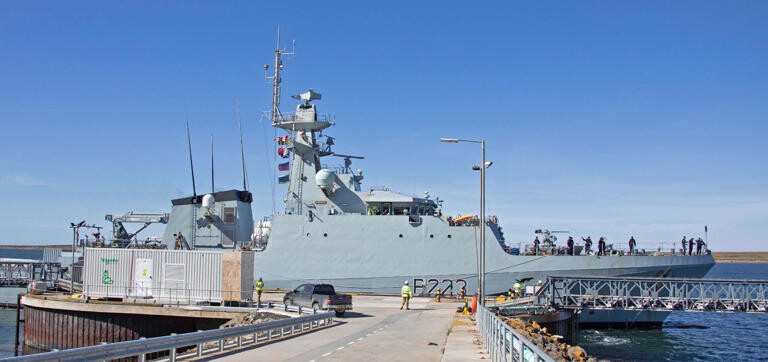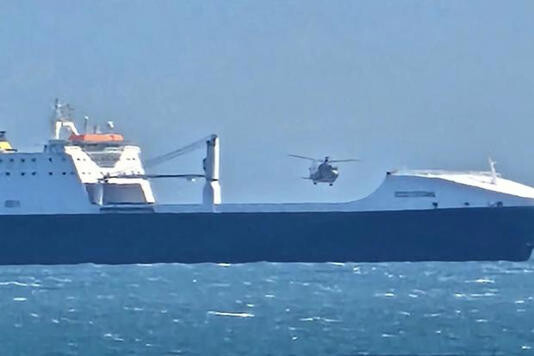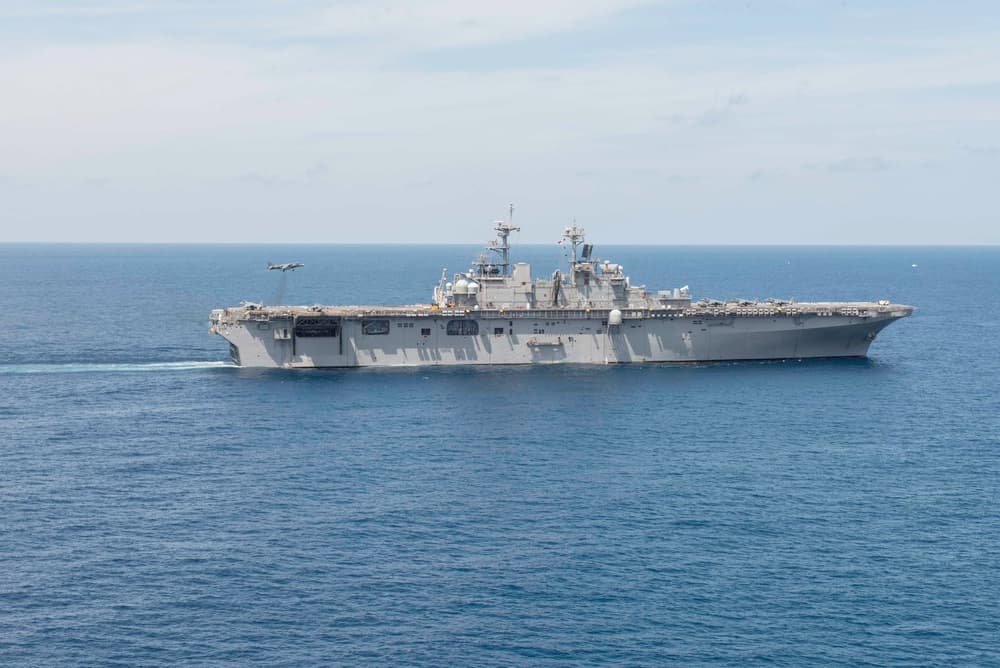
Prime Minister deploys UK military to Eastern Mediterranean to support Israel
Two enormous Royal Navy vessels - both roughly twice as long as a football pitch - have sailed from Gibraltar to the eastern Mediterranean as tensions continue to mount.
•Pictures showed the Royal Fleet Auxiliary vessels RFA Lyme Bay and RFA Argus sailing from Gibraltar yesterday on a mission to support regional stability.*
Press Release from - [Prime Minister's Office]
The Prime Minister has deployed UK military to the Eastern Mediterranean to support Israel and reinforce regional stability.
- Royal Air Force surveillance aircraft to begin patrols today to help partners track emerging threats to regional security.
- Royal Navy task group to deploy to eastern Mediterranean in coming days to help mitigate humanitarian crisis
- Military teams bolstered across the region as cooperation with Israel is stepped up
The Prime Minister has directed UK military assets to be deployed to the eastern Mediterranean to support Israel, reinforce regional stability and prevent escalation.
Maritime patrol and surveillance aircraft will begin flying in the region from Friday to track threats to regional stability such as the transfer of weapons to terrorist groups.
Meanwhile, a Royal Navy task group will be moved to the eastern Mediterranean next week as a contingency measure to support humanitarian efforts.
The military package, which includes P8 aircraft, surveillance assets, two Royal Navy ships – RFA Lyme Bay and RFA Argus – three merlin helicopters and a company of Royal Marines, will be on standby to deliver practical support to Israel and partners in the region, and offer deterrence and assurance.
The Prime Minister has also asked for all military teams in Israel, Cyprus and across the region to be bolstered to support contingency planning and the efforts of neighbouring countries to deal with any spill over from instability in Israel.
Meanwhile, the Prime Minister spoke to the Egyptian President, Abdel Fattah al-Sisi, today to understand the wider regional picture and underscore the importance of supporting civilians to leave Gaza.
He also thanked President al-Sisi for Egypt’s assistance in helping British nationals in the area.
Prime Minister Rishi Sunak said:
We must be unequivocal in making sure the types of horrific scenes we have seen this week will not be repeated. Alongside our allies, the deployment of our world class military will support efforts to ensure regional stability and prevent further escalation.
Our military and diplomatic teams across the region will also support international partners to re-establish security and ensure humanitarian aid reaches the thousands of innocent victims of this barbaric attack from Hamas terrorists.
The Prime Minister is due to speak to northern European leaders about the situation in Israel at the Joint Expeditionary Force summit in Sweden on Friday. They are expected to discuss the vital need to work with partners across the Middle East to support stability, while simultaneously remaining focussed on backing Ukraine’s defence against Russia.
He will also visit British warship HMS Diamond while in Gotland, Sweden, which is on patrol in northern Europe to reinforce security in the region. While on board, the Prime Minister will hear about the capabilities of Diamond’s sister ship, HMS Duncan, which is deployed in the Mediterranean with NATO.
The package of military support, which will work alongside allies already in the region, is a significant demonstration of the UK’s support for Israel’s right to self-defence and will allow the UK to adapt to the needs of partners as the situation evolves over the coming weeks.
The step change comes after the Prime Minister spoke to Israeli Prime Minister Benjamin Netanyahu earlier this week, and the Defence Secretary discussed the situation with his NATO counterparts in Brussels.
The Foreign Secretary visited Israel to see first hand the destruction Hamas terrorists have caused and to understand how the UK can support the efforts of the Israeli Government to ensure the safety and security of the Israeli people.
Defence Secretary Grant Shapps said:
The monstrous terrorist attacks committed by Hamas in recent days have proven why the UK must support Israel’s absolute right to self-defence and deter malign external interference. No nation should stand alone in the face of such evil and today’s deployment will ensure Israel does not.
The Royal Navy Task Group, RAF operations and our wider military support will be an undeniable display of the UK’s resolve to ensure Hamas’s terrorist campaign fails, whilst reminding those who seek to inflame tensions that the forces of freedom stand with the Israeli people.
Meanwhile, the Foreign Secretary announced that the UK will facilitate commercial flights to help vulnerable British nationals wanting to leave Israel.
The Royal Navy’s River Class offshore patrol vessel HMS Medway sailed into Gibraltar on Wednesday morning after completing a nine-month stint in the Falkland Islands.
The ship traded places with its sister-vessel HMS Forth, which sailed to the Falklands last October after undergoing major maintenance work in drydock in Gibraltar.
The Falklands deployment is focused on reassurance and support for the island community, visiting the outlying hamlets, settlements and individual farms and conducting joint training with RAF, Army and authorities on a host of tasks including search and rescue support, fishery protection and general maritime security in the area.
HMS Medway spent 105 days on patrol around the Falklands and neighbouring South Georgia, adding more than 16,500 nautical miles – equivalent so sailing three quarters of the way around the globe – to her tachometer.
The vessel is due to return to the Caribbean, its normal area of operations, but will also undergo a period of maintenance following its time in the punishing environment of the South Atlantic.
Once back in the Caribbean, she will resume regular patrols supporting British citizens in the Caribbean’s overseas territories, working with allies on counter-narcotic operations and being on hand to offer support in the event of natural disasters such as hurricanes.
A credible deterrent? Trident missile fails during test launch from HMS Vanguard
Please read and share this article using its direct link on Gibraltar Messenger. Thank you.
13th March 2024
By Sophie Wingate, PA Deputy Political Editor
Royal Navy destroyer HMS Diamond is returning to the Red Sea to help protect shipping as attacks from Yemen’s Houthi rebels on vessels continue.
The warship, which stopped in Gibraltar for maintenance and rearming, will take over from frigate HMS Richmond, which repelled two Houthi attack drones using Sea Ceptor missiles just this weekend, the Ministry of Defence said.
HMS Diamond returns to the region after operating there in December and January, when it came under fire from Iran-backed Houthi forces on three separate occasions.
The Type 45 destroyer downed nine drones using the Sea Viper missile system and guns during its time as part of the US-led Operation Prosperity Guardian, which is intended to protect shipping using the vital sea lanes.
Defence Secretary Grant Shapps said: “Protecting shipping around the world is one of the Navy’s key tasks and this deployment shows how our highly skilled sailors and advanced warships are helping to keep our sea lanes safe.”
“Britain continues to be at the forefront of the international response to the Houthis’ dangerous attacks on commercial vessels, which have claimed the lives of international mariners.”
“I thank the crew of HMS Richmond for their incredible work and am confident that HMS Diamond will continue to stand up for freedom of navigation and the safety of seafarers.”
The Yemen-based Houthi group has targeted shipping in the Red Sea and Gulf of Aden, claiming its actions are in response to Israel’s war on Hamas in Gaza – an assertion dismissed by the UK and allies.
The dangers to shipping using the sea routes have forced many vessels travelling between Asia and Europe to divert around the southern tip of Africa instead of using the Suez Canal, increasing costs and lengthening delivery times.
A Houthi missile struck a commercial ship in the Gulf of Aden last week, killing three crew members and forcing survivors to abandon the vessel.
It was the first fatal strike in a campaign of assaults by the Iranian-backed group.
After handing over to HMS Diamond, HMS Richmond will head back to the UK via Saudi Arabia for maintenance and rearming.
Royal Navy: Portsmouth ship HMS Medway suffers "mechanical issue" during post-refit trials, reports say
Navy Lookout, an analysis website which covers the Royal Navy, reported that sailors on HMS Medway had to deal with complications. They said the ship was towed back to the shores of Gibraltar on June 28 by tug boats.
HMS Medway towed into Gibraltar this afternoon following mechanical issue on post-refit trials,” the website said on X, formerly known as Twitter. HMS Medway was operating around the Falkland Islands for most of last year, a stark contrast compared to her usual tasks in the Caribbean.
She took place of her sister ship HMS Forth, which was undergoing maintenance. Both ships then swapped places, with HMS Medway undergoing engineering work after patrolling the South Atlantic for nine months and racking up 16,500 nautical miles - the equivalent of sailing three quarters of the way around the globe.
Read article.
... relying on the UK or the USA in the long-term is foolish, because, for their and your defiance of God, and rejection of the Sovereignty of Christ, they are going to lose WW3, as is prophesied in Revelation 11 about the Two Witnesses – Britain and America – the TRUE Israel. - Gibraltar’s Choices on War Strategies & God’s Protection
The boat is now currently sailing across the English Channel into Biscay Bay on the way to Gibraltar after departing from Portland on July 10.
Military cargo ship seen sailing across Dorset coast
A Royal Navy spokesperson said: “The MV Eddystone is a strategic Roll-on Roll-off vessel which supports the Royal Navy in a variety of tasks, including transport of equipment and vehicles. For security reasons, it would be inappropriate to comment on current operations."
A short stop in Gibraltar followed for a visit to some familiar, and, for some on their first overseas visit, less familiar haunts, including Casemates Square and seeing the infamous apes during the even more infamous Rock Run – a race at first light from the dockyard to the top of the mountain which dominates the Overseas Territory. Next up was a training package that saw Duncan conduct a Thursday War – a war-fighting and damage control exercise, which puts previous training into practice.
British destroyer ‘fights off’ Harrier jets in Mediterranean
Type 45 Destroyer HMS Duncan has been protecting a US Navy task group in the Eastern Mediterranean as part of a regional security mission, according to a press release.
The Portsmouth-based warship deployed at the end of May and, after intensive training and a short stop in Cyprus, linked up with two US Navy task forces – the USS Dwight D. Eisenhower’s Carrier Strike Group and USS Wasp’s Amphibious Ready Group.
The Royal Navy patrol boat HMS Medway is in Gibraltar.
The Ministry of Defence told GBC HMS Medway is completing her planned maintenance here.
She's also undergoing sea trials to prepare for future tasking.
HMS Medway is one of five River Class patrol vessels.
She's deployed to the Caribbean, where she provides support to Britain's overseas territories, and also works to help stop drug trafficking.
British special forces work with U.S. nuclear sub in Med Sea
The Ohio-class guided-missile submarine USS Georgia has completed a series of high-stakes interoperability training exercises in the Mediterranean Sea, working alongside British Special Forces, American Force Reconnaissance Marines from the 2nd Reconnaissance Battalion, and other special operations forces (SOF).
This collaboration was part of a broader effort to enhance joint operational capabilities, according to a statement from U.S. Naval Forces Europe-Africa.
The exercises, which took place in early August, involved a range of training activities designed to improve the integration of amphibious and special warfare into existing naval missions.
State of the art Royal Navy nuclear submarine being "armed" at Gibraltar
Britain´s most modern submarine, the brand-new HMS Anson is in Gibraltar on her first visit to the port. According to press reports she is being armed with weapons stored at the "Rock."
Although HMS Anson is nuclear powered she does not carry nuclear weapons. However, she is equipped with the conventionally armed Tomahawk cruise missile along with torpedoes. Her sister ship, HMS Astute, visited Gibraltar earlier this year.
